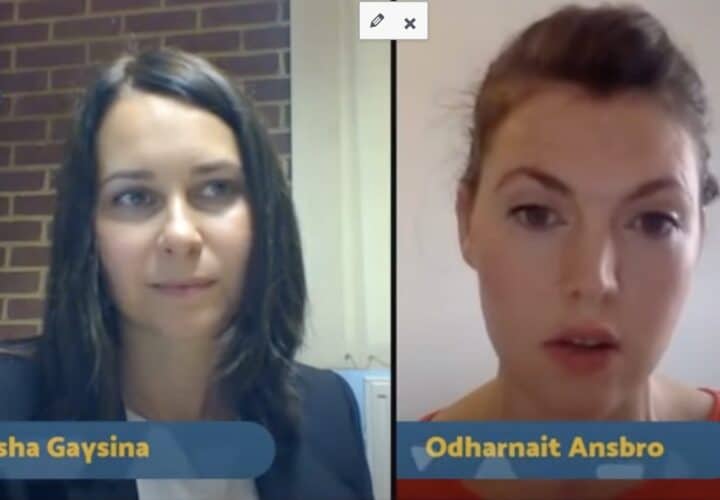Is it dementia? Or ADHD? An expert discusses where the symptoms overlap.
We might see increasing forgetfulness in older age as a red flag of mild cognitive decline or dementia. But it turns out that some of the cognitive symptoms may be manifestations of a lifelong condition: attention deficit hyperactivity disorder. As psychiatrist at McLean Hospital Stephanie Collier writes for Harvard Health, while we often think of ADHD as a childhood disorder, it can also affect older adults. In fact, about three out of every 100 older adults has ADHD.
Clinical practice and scientific research on ADHD is growing: More people are receiving ADHD diagnosis and treatment, and researchers understand that ADHD is one of the most heritable disorders in medicine. But because the disorder has only become better known in recent decades, for many it has gone undiagnosed, and research and clinical focus on older adults with ADHD is still scant.
“Older people with ADHD who have never been diagnosed may suddenly fear that they’re developing dementia because they are absent-minded and forgetful,” said Kathleen Nadeau, founder and clinical director of The Chesapeake Center ADHD, Learning and Behavioral Health.
But, she said, it’s hard to find doctors with the expertise: “Very few neurologists have any training in recognizing and diagnosing adult ADHD.”
And because its symptoms may mirror those of dementia, mild cognitive decline, or normal aging, it takes a keen eye and thorough assessment to accurately diagnose older adults with ADHD.
Searching for Signs of Undiagnosed ADHD in Adults
“To distinguish ADHD from age-related cognitive changes is to understand that ADHD is a childhood and adolescent disorder that continues into adulthood,” said David Goodman, an assistant professor of psychiatry and behavioral sciences at Johns Hopkins University School of Medicine.
To assess whether patients had symptoms of ADHD earlier in life, Goodman generally asks his patients about their symptoms from elementary to high school, in college or during their first jobs.
According to J. Russell Ramsay, an associate professor of clinical psychology at the University of Pennsylvania Perelman School of Medicine, family members can help recall the possible presence of these symptoms throughout people’s lives. School reports may offer clues, too.
People may have had a hard time concentrating in class. Perhaps they were known as the class clowns. Some may not have made it as far into school as they would have liked. They may have changed jobs frequently. At work, people may have had difficulty completing a task efficiently, failing to follow their schedules and working overtime to make up for their procrastination.
“ADHD doesn’t suddenly emerge when you’re 75 years old,” Nadeau said. “For the differential diagnosis, you need to get information from reliable reporters that have known this person for many years.”
Doctors can also get a better picture of whether someone may be displaying signs of ADHD, Ramsay said, by asking people about their self-regulation skills — how they manage their time, organize their tasks, and motivate themselves to complete assignments.
Some people’s symptoms of ADHD may have been too mild for a formal diagnosis, Nadeau said, especially for those with a high IQ who have generally been able to compensate for the setbacks ADHD presents.
But people’s symptoms can worsen as they take on more complex tasks.
The Ebbs and Flows of ADHD Symptoms
“We have stereotypes that people with ADHD are all hyperactive, poor students and don’t get very far in life,” Nadeau said. “Those people certainly exist. But ADHD exists across a huge span of abilities.”
Nadeau had a patient who was a successful student with an undergraduate and a graduate degree at Harvard. Faced with the daunting task of completing his dissertation for his Doctor of Philosophy degree, however, his symptoms of ADHD worsened.
“He just couldn’t organize himself to do this very long-term project,” Nadeau said.
“What we find is that if people are bright, live in supportive and well-organized households, and go to schools that are not terribly challenging for them, they can be honorable students. And yet they have ADHD, and the ADHD begins to manifest itself as school becomes more demanding.”
Symptoms of ADHD may also flare when people lose the structure in their lives. For older adults, this may happen concurrent with retirement.
Many find the abandonment of the daily routine of work to be a massive adjustment, and for adults with ADHD, it can cause symptoms to emerge. Those symptoms can cause difficulties with sleeping and eating, which in turn can exacerbate the condition further. Older adults with ADHD may feel restless, or begin to miss social cues, interrupting others in conversations and speaking impulsively. They could experience moments of blankness and memory lapses.
As Ramsay put it: “As much as we rail and complain about going to school and work, they give us a scaffolding for our day.”
Treating ADHD in Older Adults
Stimulant drugs for children and adolescents, such as methylphenidate or dextroamphetamine, have been effective for treating symptoms in older adults, according to Goodman. “Older people tend to respond equally well to these medications,” he said.
In general, older adults need lower medication dosages. For his patients, Goodman said he would start low and increase dosage slowly based on his clinical observations. Doctors must also consider the cardiac risks of the medications including increased heart rate and blood pressure.
Lifestyle changes like eating healthy, sleeping well and exercising regularly can also be beneficial for people with ADHD.
“When we exercise aerobically, our brains produce this protein called BDNF, which stands for Brain-derived Neurotrophic Factor,” Nadeau said. “BDNF promotes the growth of new neurons in our brains which improves our memory. I’m always talking to seniors with ADHD about how very important it is to exercise enough to get their heart rate up to 80 percent of maximum for at least 20 or 30 minutes a day.”
According to Collier, regular exercise helps to boost the dopamine, norepinephrine, and serotonin in the brain, potentially helping with attention, and better sleep or a bedtime routine, asking for support from one’s family or other helpers to create structure and simply tasks, and setting reminders to assist with remembering daily tasks, can help create structure and ease ADHD symptoms.
Ramsay said that cognitive behavioral therapy — which has been effective in treating depression and anxiety disorders — may also be beneficial for people with ADHD, especially for older adults entering retirement.
“If you suspect your symptoms may be the result of ADHD, especially if a close family member has received this diagnosis,” Collier writes, “do not hesitate to ask your primary care physician for a referral to a specialist with expertise in the diagnosis and management of ADHD in older adults.”






i just want to leave this comment about adhd if i have got it-it reminds me of a song i have always loved:like a circle in a spiral -like a wheel within a wheel -ever turning -ever spinning -like an ever spinning wheel etc in the windmills of my mind–or something close to that
This is perfect to describe how I feel. Trying to survive my ADHD is challenging. Chin-up Pip – pip etc.
Sincerely, Jan age 71
The paragraph describing high IQ until demands are too high is exactly me and brings a huge relief to know it is part of my disability. I wasn’t diagnosed until almost 50 as i truly believed i had Dementia.
I find it impossible to explain the loss of all the things i learned (i was an engineer) and the extreme anxiety that is now 95% of my life.
Fabulous article.
Thank you.
It is very hard, especially for women, to find a physician who will not dismiss any cognitive trouble as incipient Alzheimers without any further investigation
This Artical is right on it. I grew up with ADD/ADHD. I am now 70 and they did a pet scan showing I have Alzheimer AD. I also found scans of of ADD/ADHD and they are Identical to My Pet Scan. A Few weeks ago I was at the DMV in Florida renew my License and they asked me if I had anything would compromise my driving and if I was not honest with them I could be arrested. They showed me a list of ailments which I had none of. They then repeated was I sure I said yes. Then they asked if I had anything that was not on the list and let them know I was recently diagnosed with Alzheimer. They took my Drivers license away and cut it up. They told me to not drive anymore or I could be arrested if pulled over.
I have logged over 1.2 million miles during my life. Never involved in an accident until this past June when I was waitin at a stop light and a 17 Year old Kid ran a red light and hit car that hit me totaling my car.
It is nice to know that what we have, or are experiencing in not our fault, it’s just something that we have.
Im 63 y/o retired year ago from 41 years as RN with same Company. After about 6 months I started really.getting more forgetful, was terrified I was getting dementia. My Dr said I needed to ne tESted for ADHD, which I found ridculous at my age! I was more concerned I was more cincerned with my cognition. I FINALLY got tested with all kinds psycholigical testing. Found my Cognition was fine, but I was T-78% IN ADHD Scale. My spouse & adult children also had to fill out forms & I.eas surprised to hear them say they ALWAYS knew I was ADHD! Im waiting on my primary Dr to read my results & decide on a treatment plan. Thrilled that my Cognition is Great, but surprised at this diagnosis. Explains alot about the way I am.
We’re glad the testing assured your cognition is strong. An adult ADHD diagnosis can definitely surprise, but many find relief through treatment plans. Wishing you the best as you adjust to this new self-understanding, Penni!